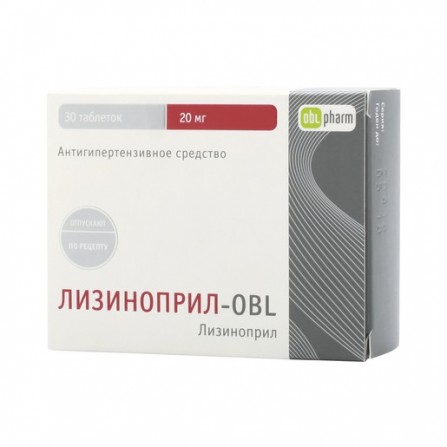Lisinopril-OBL pills 20mg N30
Condition: New product
1000 Items
Rating:
Be the first to write a review!

More info
Active ingredients
Lisinopril
Release form
Pills
Composition
Lisinopril 20 mg
Pharmacological effect
ACE inhibitor. The mechanism of antihypertensive action is associated with inhibition of ACE activity, which leads to a decrease in the rate of conversion of angiotensin I to angiotensin II (which has a pronounced vasoconstrictor effect and stimulates the secretion of aldosterone in the adrenal cortex). As a result of reducing the formation of angiotensin II, a secondary increase in plasma renin activity occurs due to the elimination of negative feedback upon the release of renin and a direct decrease in aldosterone secretion. Reduced aldosterone secretion may increase potassium concentration. Reduces round fist (afterload), sticking pressure in pulmonary capillaries (preload) and resistance in pulmonary vessels, increases cardiac output and load tolerance. Lysinopril reduces albuminuria. In patients with hyperglycemia, it helps normalize the function of the damaged glomerular endothelium. It does not affect the concentration of glucose in the blood of patients with diabetes mellitus and does not lead to an increase in cases of hypoglycemia.
Pharmacokinetics
After ingestion, lisinopril is slowly and incompletely absorbed from the gastrointestinal tract. Absorption is on average 25%, characterized by high variability - 6-60%. Cmax in plasma is reached in approximately 7 h. The binding to plasma proteins is insignificant. Excreted unchanged in the urine. In patients with normal kidney function, T1 / 2 is 12 hours. Lysinopril is eliminated from the body by hemodialysis.
Indications
Essential and renovascular arterial hypertension (as monotherapy or in combination with other antihypertensive drugs). Chronic heart failure (as part of combination therapy). Acute myocardial infarction (during the first 24 hours with stable hemodynamic indicators to maintain these indicators and prevent left ventricular dysfunction and heart failure). Diabetic nephropathy (to reduce albuminuria in patients with insulin-dependent diabetes mellitus in normal blood pressure and in patients with insul diabetes mellitus with arterial hypertension).
Contraindications
Pregnancy, hypersensitivity to lisinopril and other ACE.
Precautionary measures
During treatment, psoriasis may worsen. During pheochromocytoma, propranolol can only be used after taking an alpha blocker. After a long course of treatment, propranolol should be discontinued gradually, under the supervision of a physician. during anesthesia, you must stop taking propranolol or find a remedy for anesthesia with minimal negative inotropic effects. The impact on the ability to drive vehicles and control mechanisms of patients whose activities require increased attention, the question of the use of propranolol on an outpatient basis should be addressed only after evaluating the individual response of the patient.
Use during pregnancy and lactation
Lisinopril is contraindicated for use in pregnancy. It is not known whether lisinopril is excreted in breast milk. Use with caution during lactation (breastfeeding).
Dosage and administration
Individual, depending on the indications, treatment regimen, kidney function. Initial dose of 2.5 mg 1 time / day. Maintenance doses of 5-20 mg.
Side effects
Since the cardiovascular system: possible hypotension, pain behind the sternum. On the side of the central nervous system: dizziness, headache, muscle weakness. On the part of the digestive system: diarrhea, nausea, vomiting. On the side of the respiratory system: dry cough. On the side of the hematopoietic system : agranulocytosis, decrease in hemoglobin and hematocrit (especially with long-term use); in isolated cases - an increase in ESR. From the side of water-electrolyte metabolism: hyperkalemia. From the side of metabolism: an increase in creatinine and urea nitrogen (especially in patients with kidney disease, diabetes, renovascular hypertension). Allergic reactions: skin rash, angioneurotic edema .Other: in rare cases - arthralgia.
Interaction with other drugs
With simultaneous use with antihypertensive agents, an additive antihypertensive effect is possible. When used simultaneously with potassium-saving diuretics (spironolactone, triamterene, amiloride),potassium supplements, potassium-containing salt substitutes, increases the risk of hyperkalemia, especially in patients with impaired renal function. With simultaneous use of ACE inhibitors and NSAIDs, the risk of developing impaired renal function is increased, hyperkalemia is rarely observed. antihypertensive effect is enhanced. The occurrence of severe arterial hypotension, especially after taking the first dose of a diuretic, is apparently due to hypovolemia, which leads to a transient increase in the hypotensive effect of lisinopril. The risk of impaired kidney function increases. When used simultaneously with indomethacin, the antihypertensive effect of lisinopril decreases, apparently due to inhibition of prostaglandin synthesis under the influence of NSAIDs (which are believed to play a role in the development of the hypotensive effect of ACE inhibitors). When used simultaneously with insulin, hypoglycemic agents of sulfonylurea derivatives may develop hypoglycemia by increasing glucose tolerance. When used simultaneously with clozapi The concentration of clozapine in the blood plasma increases. When used simultaneously with lithium carbonate, the concentration of lithium in the blood serum increases, accompanied by symptoms of lithium intoxication. The case of severe hyperkalemia in a patient with diabetes mellitus with simultaneous use with lovastatin is described. with pergolide. When used simultaneously with ethanol, the effect of ethanol is enhanced.
special instructions
Lisinopril should not be used in patients with aortic stenosis, pulmonary heart. Do not use in patients with acute myocardial infarction: with the threat of serious hemodynamic disorders associated with the use of a vasodilator; in case of impaired renal function. Renal function should be monitored before and during therapy. Before starting treatment with lisinopril, it is necessary to compensate for the loss of fluid and salt. With extreme caution, patients with impaired renal function, with renal artery stenosis,severe congestive heart failure. The likelihood of arterial hypotension increases with fluid loss due to diuretic therapy, salt-restricted diets, nausea, vomiting. In patients with congestive heart failure with normal or slightly reduced blood pressure, lisinopril can cause pronounced hypotension. Simultaneous lysinopril is not recommended. with potassium-sparing diuretics, dietary supplements and potassium-containing salt substitutes. When lysinopril is applied simultaneously with the preparation s lithium should control the concentration of lithium in the blood plasma.




